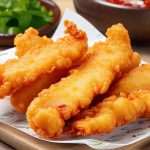The experience is almost universal: you indulge in a delicious, greasy takeout meal – pizza dripping with cheese, crispy fried chicken, a mountain of onion rings – only to find yourself rushing to the bathroom shortly after. Loose stools, diarrhea, stomach cramps… it’s an unpleasant aftermath that many associate with high-fat foods. But why does this happen? It’s not simply about overeating; there’s a complex interplay between our digestive system and how it handles large amounts of fat. Understanding the mechanisms behind this phenomenon can help us make informed choices about what we eat, manage these uncomfortable symptoms, and potentially prevent them in the future.
This isn’t necessarily a sign of illness or intolerance for most people; often, it’s simply a physiological response to an overload on the digestive system. Our bodies are remarkably adaptable, but they have limits. High-grease foods present a significant challenge because fats are more difficult to digest than carbohydrates or proteins. The process demands extra effort from several organs – the stomach, pancreas, gallbladder, and intestines – and when overwhelmed, this can lead to accelerated gut motility (the speed at which food moves through your digestive tract) and subsequent loose stools. This article will explore the reasons behind these reactions, providing insights into the processes occurring within our bodies when confronted with a particularly fatty meal. If you are looking for more information on what happens after a diagnosis, consider follow-up testing.
The Digestive Process & Fat Overload
Digestion is rarely a simple process; it’s a carefully orchestrated series of events. When food enters your mouth, it begins its journey through the digestive system. Carbohydrates are broken down in the mouth and small intestine, proteins in the stomach and small intestine, but fats require a more complex approach. The initial breakdown of fats actually starts in the mouth with lingual lipase (though this is minimal). However, the bulk of fat digestion happens in the small intestine. Here’s where things get interesting when dealing with high-grease meals:
- Bile, produced by the liver and stored in the gallbladder, emulsifies fats – breaking them down into smaller droplets so they can be more easily digested.
- The pancreas releases pancreatic lipase, an enzyme that further breaks down these fat droplets into fatty acids and glycerol.
- These components are then absorbed through the intestinal walls into the bloodstream.
When you consume a very greasy meal, your gallbladder is forced to release a large amount of bile, and your pancreas works overtime producing lipase. This increased workload can sometimes overwhelm the system. The body may not be able to efficiently absorb all the fat, leading to it moving more rapidly through the intestines. Undigested fat in the colon draws water into the stool, resulting in looser consistency and potentially diarrhea. The sheer quantity of fat also alters gut motility, speeding up the digestive process. This rapid transit time doesn’t allow for proper water absorption, further contributing to loose stools. Understanding tracking gut health can help you better manage these symptoms.
Furthermore, certain types of fats are harder to digest than others. Saturated fats generally cause more issues than unsaturated fats because they require more bile and pancreatic lipase for breakdown. Trans fats are also notoriously difficult for the body to process efficiently. Therefore, the type of grease in your takeout order matters just as much as the quantity. Fried foods, often cooked in oils high in saturated or trans fats, are prime culprits behind post-meal digestive distress.
Why Some People Are More Sensitive
Not everyone experiences loose stools after consuming greasy food to the same degree. Several factors can influence an individual’s sensitivity:
- Individual Digestive Capacity: Some individuals naturally have more efficient digestive systems than others. This is partially determined by genetics, but also influenced by lifestyle factors like diet and exercise. Those with a history of digestive issues might be more prone to experiencing symptoms.
- Gallbladder Function: The gallbladder plays a vital role in fat digestion. If your gallbladder isn’t functioning optimally (perhaps due to gallstones or inflammation), it may not release enough bile to properly emulsify the fats, leading to malabsorption and subsequent diarrhea. This is why people who have had their gallbladder removed often report increased sensitivity to fatty foods.
- Pancreatic Enzyme Production: Similarly, if your pancreas isn’t producing sufficient lipase, fat digestion will be impaired. Conditions like pancreatic insufficiency can significantly limit the body’s ability to process fats.
It’s important to note that chronic diarrhea or significant digestive discomfort after eating even moderate amounts of grease warrants a medical evaluation. While occasional loose stools are common, persistent symptoms could indicate an underlying health issue requiring attention. A healthcare professional can help determine if there is a more serious problem at play. You may also want to review markers that track gut recovery, especially after illness.
Dietary Considerations & Prevention
Proactive steps can be taken to minimize the likelihood of experiencing digestive issues after indulging in takeout:
- Portion Control: Simply eating smaller portions of greasy food can reduce the overall burden on your digestive system. A single slice of pizza is less likely to cause problems than four slices.
- Pair with Fiber: Combining high-fat foods with fiber-rich foods like salads or whole grains can help slow down digestion and improve absorption. Fiber adds bulk to stool, which can moderate gut motility.
- Hydration: Drinking plenty of water helps facilitate the digestive process and prevents dehydration, especially if you experience diarrhea.
- Choose Cooking Methods Wisely: Opt for grilled, baked, or steamed options whenever possible instead of fried foods.
Beyond these immediate strategies, adopting a generally healthy diet can improve your overall digestive function over time. A diet rich in fruits, vegetables, and whole grains promotes optimal gut health and strengthens the body’s ability to handle fats. Remember that consistency is key – regular dietary habits contribute more to long-term digestive well-being than isolated changes. If you’ve recently switched diets, testing can help understand how your body is responding.
Managing Symptoms & When To Seek Help
If you do experience loose stools after consuming a high-grease meal, here are some ways to manage the symptoms:
- Stay hydrated by drinking clear fluids like water or electrolyte solutions.
- Avoid dairy products and caffeine, as these can sometimes exacerbate diarrhea.
- Consider taking an over-the-counter anti-diarrheal medication if symptoms are severe (always follow package instructions).
- Rest your digestive system by eating bland foods like toast, rice, or bananas.
However, it’s crucial to recognize when symptoms warrant medical attention. Seek professional help if you experience any of the following:
- Severe abdominal pain
- Blood in your stool
- Fever
- Persistent diarrhea lasting more than a few days
- Signs of dehydration (extreme thirst, dizziness, infrequent urination)
These could indicate a more serious underlying condition that requires diagnosis and treatment. Don’t attempt to self-diagnose or treat persistent digestive issues. Consulting with a healthcare professional is the best course of action to ensure your health and well-being. The body often signals when something isn’t right, and listening to those signals is paramount for proactive health management. It may be helpful to review checkpoints after a scare. Additionally, consider top tests for tracking gut repair if you’ve recently been ill. Lastly, if rapid weight loss is a concern, digestive tests can offer valuable insights.


















